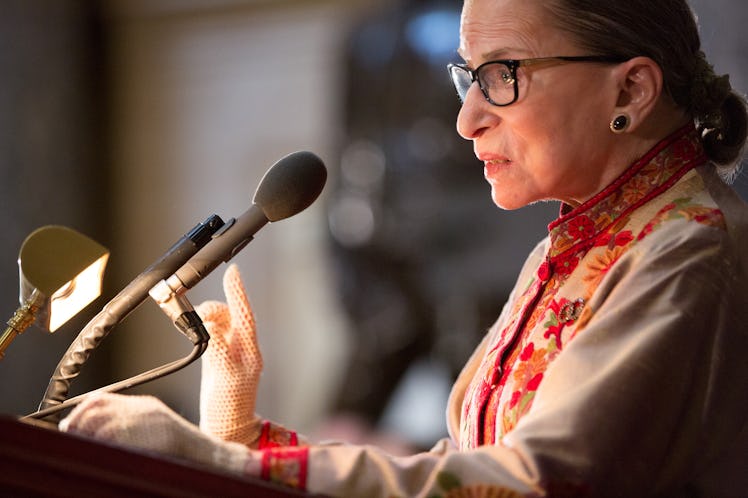
Here's What Ruth Bader Ginsburg Has Said About Retiring, If You're Getting Nervous
The imminent retirement of Supreme Court Justice Anthony Kennedy won't just represent the stepping down of a swing vote on the bench. The retirement means the departure of one of three justices who will be either 80 years of age or older by the end of 2018. It's no secret who the oldest of that trio is, and that makes Justice Ruth Bader Ginsburg's quotes about retiring all the more notable, as the future of the court becomes a more interesting topic.
Justice Ginsburg turned 85 in March. Two months before that, she spoke about the possibility of ending her tenure, during the Sundance Film Festival in Utah.
During an open forum, Ginsburg said that she's in "very good" health and that she had no plans of retirement. "As long as I can do the job full steam, I will be here," she said, per the Los Angeles Times.
That particular quote is consistent with all the other times Justice Ginsburg has spoken about her health and physical fitness — she's known to work out and a picture of her planking has gone viral in lieu of Justice Kennedy's retirement.
"Now I happen to be the oldest [member]," she told The New York Times in 2015. "But [former Justice] John Paul Stevens didn’t step down until he was 90."
Despite Justice Ginsburg's long held insistence that she is both in good health and disinterested in leaving the court — she's hired clerks through 2020 — the retirement announcement from Justice Kennedy still prompted half-joking-but-kinda-serious prayers for his elder colleague.
"Prayers to Ruth Bader Ginsburg who is being FedEx’d 155,000,000 green juices as we speak," tweeted HuffPost reporter Eliot Nelson.
"I am adding Ruth Bader Ginsburg's long life and health to my daily prayers. that's at least five RBG prayers a day, seven days a week," added Libyan-American writer Hend Amry.
The fears of Democrats about the future of the court and the longevity of Justice Ginsburg highlight three very important political subjects that might have flown under the radar during the past couple of years, but are under a glaring spotlight now, thanks to Justice Kennedy's retirement.
First, there's the fact that during President Barack Obama's tenure, there was an argument among some political commentators that Justice Ginsburg, and fellow Justice Stephen Breyer (who turns 80 in August), should have retired while a Democrat was still in office.
Harvard Law School professor Randall Kennedy outlined the case for The New Republic in 2011. He wrote,
Cloaked with lifetime tenure, federal judges have a unique power to determine when their judicial careers should end and thus possess an important, though oft-overlooked, way of influencing the trajectory of the federal bench. Many federal judges exercise this power by retiring or taking senior status (a form of semi-retirement) when a president sharing their political-juridical values is in office. Thus it is that liberal-leaning justices such as Harry Blackmun, John Paul Stevens, and David Souter retired during the Clinton and Obama presidencies, while more conservative-leaning justices such as Sandra Day O’Connor, Lewis Powell, and Warren Burger retired during the Reagan, Bush I, and Bush II presidencies.
Now, in the aftermath of Kennedy's announcement, that case is being revisited. Harvard professor Maya Sen tweeted, "Her choice not to strategically retire under Obama made her a cool & hip lady but was actually very bad for liberals."
Second, the worries about Justice Ginsburg's tenure illuminate the idea that, as conservative writer Matt Lewis put it, some conservatives "held their nose and voted Trump."
For a Republican candidate, winning the 2016 election, with potential for reelection in 2020, meant the opportunity to cement a conservative majority on the Supreme Court for a generation. At the start of the Trump presidency, former Justice Antonin Scalia's seat was still vacant, and the specter of Kennedy's retirement was lingering over the court.
Even if there were traditional conservatives who didn't like Trump — and there was no shortage of them — they had a strong motive to vote for him, in theory. And he knew it.
"If you really like Donald Trump, that's great, but if you don't, you have to vote for me anyway," Trump said at a rally in July 2016. "You know why? Supreme Court judges, Supreme Court judges."
The exit polling numbers supported that theory, too.
Third is the fact that while the casual observer might think of judges as appointees simply meant to uphold the Constitution, events like Kennedy's retirement show how federal judges are truly viewed in politics.
People don't just view them as skilled or unskilled, good or not good. In the context of high stakes Supreme Court appointments, they're viewed as liberal or conservative.
Kennedy's retirement almost certainly will result in a 5-4 conservative majority for a long while. Justice Ginsburg's quotes about retirement hint that she doesn't want to let that figure become 6-3 any time soon.